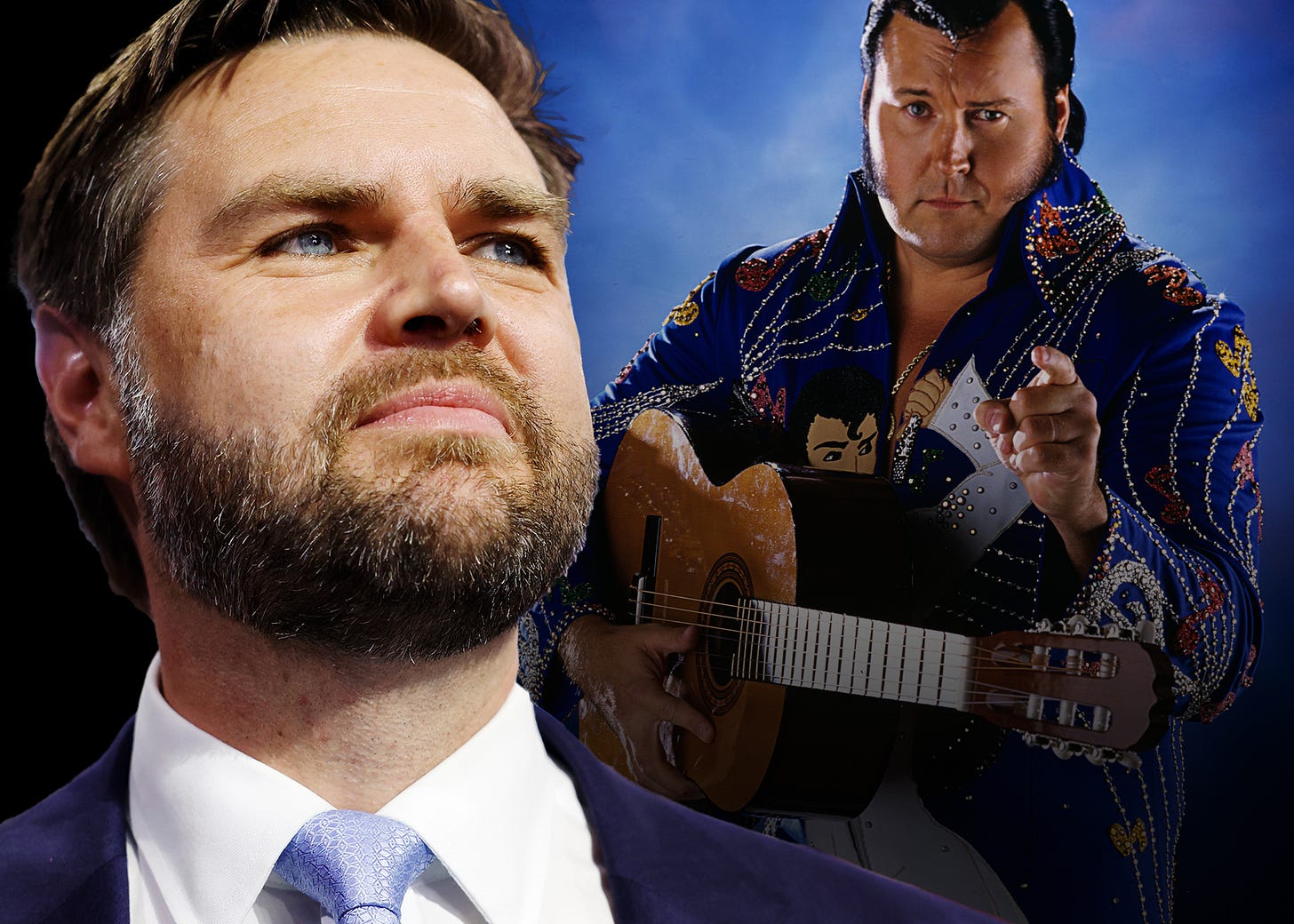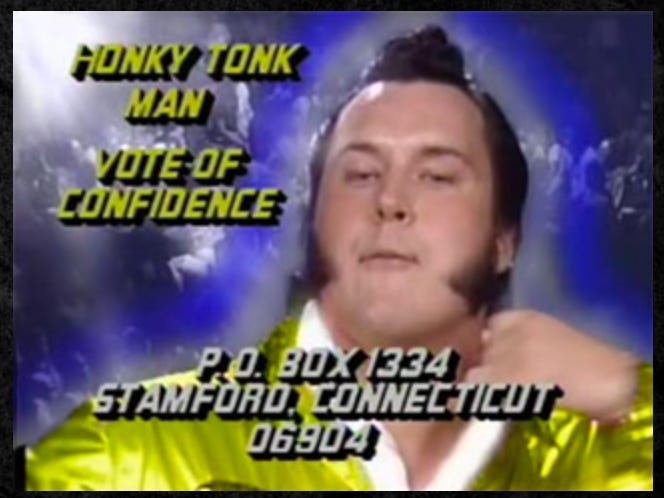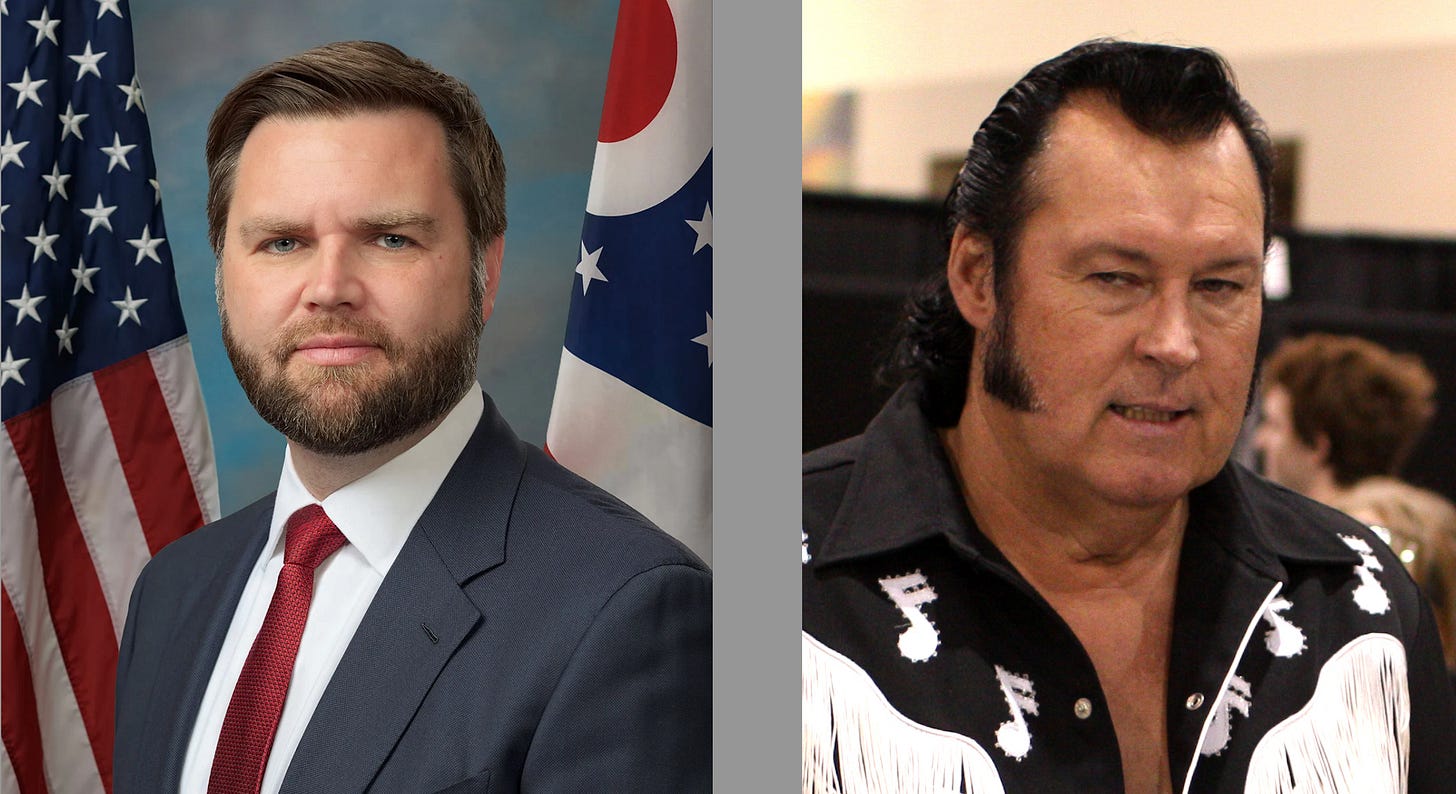JD Vance and the Honky Tonk Man
Why MAGA’s thirstiest try-hard (probably) won’t get the brass ring.
Heads up: This week I’m traveling for our Bulwark live shows in Chicago and Nashville, so the newsletter may be irregular, both in content and scheduling.
Today we’re going to talk about why JD Vance is going to fail in his quest to inherit MAGA from Donald Trump. As is usually the case, professional wrestling is the best guide to our political reality.
1. Patrons
If you can’t force yourself to sit through JD Vance’s conversation with Ross Douthat, you should just watch Tim’s Cliff’s Notes version.
There’s a dark irony in Vance using Ross NeverTrump(?) Douthat1 and the woke New York Times as a vehicle for shoring up his position as the heir to MAGA. But also, it’s a revealing choice. Where Trump used Breitbart and Alex Jones to take over the Republican party by winning over the great unwashed, Vance has decided that his base is the conservative nomenklatura and that he can cement his claim to the throne with the support of Ross Douthat, Rod Dreher, and Peter Thiel.
This isn’t as crazy as it might seem. In politics, there is an inside game and an outside game.
The outside game is popular support—it’s when a figure harnesses public sentiment to capture political power. The inside game is more about attaining power by mastering the elites. The two ur-examples here in politics are Donald Trump and Mitch McConnell.
In professional wresting there is also an ur-example. Let me tell you a story about Hulk Hogan and the Honky Tonk Man.
Roy Wayne Farris wrestled under the name Honky Tonk Man and his gimmick was that of a sweaty Elvis impersonator who hit people over the head with guitars.2 In the mid-1980s, Honky Tonk worked in a Canadian promotion called Stampede Wrestling.
Honky Tonk was—in real life—a close friend of Hulk Hogan who at the time was the most powerful man in wrestling.
You know about Hogan. He’s the guy who took wrestling mainstream in the 1980s. Before Hogan, wrestling had been a regional subculture. Hogan transformed it into American pop culture. Because of Hogan, wrestling was on MTV and NBC. Wrestlers became movie stars. There were Saturday morning cartoons about wrestling; the aisles at Toys ‘R’ Us were filled with wrestling action figures.
During this period, the WWF was in the process of driving all of the regional promotions out of business as Vince McMahon (the owner of the WWF) and Hogan remade the industry into a monopoly.
As the top guy, Hogan exercised enormous influence over the WWF’s creative operations. If Hogan wanted to develop a storyline in a certain way, the company did it. If Hogan wanted to push a particular wrestler, the company did it. And if Hogan wanted to hire his buddies, the company did it.
Which is how the Honky Tonk Man came to be employed by the WWF in July of 1986.
Hogan liked having his friends around him, which is why the WWF of the 1980s had two kinds of stars.
There were sui generis stars, who were some of the greatest performers in the history of the business—Andre the Giant, Randy Savage, the Iron Shiek, Jake Roberts. And then there were Hulk Hogan’s buddies. This second group tened to be middling talents who kept the big guy happy on the road: Brutus Beefcake, the Nasty Boys, his IRL nephew Horace Hogan.
And the Honky Tonk Man.
Hogan convinced the WWF to hire Honky Tonk and position him as a face. Hogan pushed him behind the scenes and in the ring by cutting promos and telling fans to embrace him.
The problem was that the Honky Tonk Man couldn’t get over.
He was an average in-ring worker. His gimmick was silly. And he was a black hole of charisma.
For months the WWF pushed the Honky Tonk Man to the moon. But no matter how hard the company tried, the audience rebelled. People hated the character.
In an act of desperation, WWF started a write in campaign asking fans to give Honky Tonk a “vote of confidence.”3
When that vote failed to materialize, the WWF didn’t fire Honky Tonk. They made him a heel.
Honky Tonk’s heel turn went somewhat better—his negative charisma worked in his favor when it came to making fans hate him. And Hogan kept pushing the WWF to promote him, even convincing them to give him the Intercontinental title, a traditional steppingstone to the top jobs in the company.
But Honky Tonk’s weaknesses as a wrestler couldn’t be overcome with his heel gimmick. He was still just an replacement-level worker4 and his lack of creativity made him lean on cheap heat to stoke the audience’s disapproval.
After winning the Intercontinental belt, fans went from hating the Honky Tonk character in the normal way (what’s called heel heat) and gave him what is known in the business as “nuclear heat.”
When a heel character is working well in wrestling, he gets a passionate response from fans who love to hate him. But when a character tips over into nuclear heat, it means the audience no longer enjoys watching him get humiliated. It means that they resent his presence and disagree with the company’s decision to push the character. In Honky Tonk’s case, the audience didn’t want him to lose—they wanted him written off the show. They wanted the Honky Tonk Man to go away.
In 1991, after five years of trying to make the Honky Tonk Man happen, the WWF gave up and sent him on his way.
The lesson is that in wrestling, you can have the best inside game in the world—you can be friends with all the power players and be a good corporate soldier—but you have to be able to make the audience embrace you.
And if you can’t, then you have a hard ceiling.
2. Hillbilly
JD Vance is the Republican party’s Honky Tonk Man.
His base of power isn’t Republican voters, but Republican elites. He’s spent his entire adult life currying favor with more powerful patrons—progressing from Amy Chua, to David Frum, to Peter Thiel, to Tucker Carlson, and finally to Donald Trump’s children. Instead of making himself popular with voters, Vance chose to work the inside game. He targeted people with enough juice to give him the prizes he wanted.
This campaign worked. The vice presidency is the Intercontinental title of American politics.
Vance has changed gimmicks, too—going from media-friendly Never Trump intellectual, to paleocon darling, to try-hard MAGA troll. He’s changed his politics, his name, and even his religion in an attempt to get over with the crowd. Just like Honky Tonk.
They even have the same dead, close-set, beady little eyes.
If you don’t want to join The Bulwark just just on the strength of this, then I can’t help you. Because my friends, this is as good as it gets.
Just like Honky Tonk, Vance has never been able to overcome his intrinsic limitations. He’s smug and inauthentic; self-involved and utterly humorless. As good as he is in a room with VC funders or Claremont groupies, he seems to have no idea how to act around normal human beings.
While his heel turn has gone better than his run as a babyface, Vance’s reliance on cheap heat (insulting women; pushing lies about immigrants eating pets) betrays a lack of political imagination. And his preference for the Ross Douthats of the world over the Alex Joneses suggests that Vance believes a populist base can be built on the support of political elites.
Meaning that whatever lip service Vance pays to MAGA populism, he still holds a pre-Trump view of the Republican party as a place where elites have the power to foist leaders on the rubes.5
Vance’s path to the White House relies on the inside game. He has positioned himself not as someone able to defeat his rivals, but as the guy who can convince them not to run. You can imagine Vance telling Tucker or Don Jr. how much work being president is and how they don’t really want the headache. How he can get them everything they want out of the presidency without them having to put up with the hassle. How all they have to do is stand aside and let him do the dirty job of being president for them while they get all the perks.6
That inside game worked for Mitch McConnell as leader of a Senate conference made up of fifty drab, rich fogies. It seems unlikely to work for a guy who wants to be Mussolini’s successor at the head of a column of nationalist fervor.
3. Trumpism Is Maoism
We’re going to talk about this Drew Pavlou piece later in the week, so go read it right now:
In 1958, Chairman Mao Zedong declared a jihad against the humble Eurasian tree sparrow.
Overnight, posters went up everywhere exhorting the Chinese to exterminate sparrows and other pests so as to ‘‘build happiness for ten thousand generations.’’
Hundreds of millions of Chinese were mobilised for the crusade. Mao himself demanded the enlistment of child soldiers, telling the Second Session of the Eighth Party Congress: ‘‘The whole people, including five-year old children, must be mobilized to eliminate the four pests.’’1
The sparrows were systematically hunted, burned and shot wherever they could be found. Millions terrorised them to their deaths, banging loud pots and drums near their nests until the frightened sparrows eventually dropped from the sky out of exhaustion. Others went out into the forests to climb trees and smash their eggs.
The societal mobilisation for this effort was total. Refusal to participate was tantamount to treason. Dutch historian Frank Dikotter found archival records showing at least one elderly man spent a month in confinement north of Beijing for failing to catch enough sparrows.2 All in all, up to two billion sparrows were slaughtered in a bloodbath of revolutionary fervour.
What on Earth motivated this maniacal crusade? Mao believed the tiny birds were robbing the Chinese people of their revolutionary gains by stealing the grain harvest. By wiping out the sparrow, Mao would ‘’conquer nature,’’ boosting grain yields to pay for the rapid forced industrialisation of China.
The only problem was that the sparrows hunted locusts. Free from their natural predators, locust populations exploded across China, blanketing the skies and devouring grain crops. The resulting famine killed at least 40 million people in a disaster of world-historic proportions.
Far from conquering nature, Mao and his regime were broken on its back; his fervent commitment to ideological purity and magical thinking in the face of science, reason and conflicting evidence brought about the single greatest economic policy disaster in the entirety of human history.
Trump’s Unique Pathologies
‘‘Chairman Mao is the reddest, reddest sun in our hearts’’ - Maoist Cultural Revolution era poster held by the Library of Congress
‘‘We can't just ignore the president's desires’’ - Vice President J.D. Vance
Like Chairman Mao, President Donald Trump subscribes to a wide range of bizarre crackpot theories about economics, politics and world affairs. And like the Great Helmsman, he too has managed to concentrate an extraordinary amount of power in his hands, building up an immense personality cult so as to terrify other figures in his party into submission.
Douthat’s “Never Trump” pose is roughly equivalent to Glenn Greenwald’s, only less principled. He is formally against Donald Trump, while simultaneously supporting Trump and all his works and opposing every force that would stop Trumpism.
Say what you will about Greenwald, but at least he has the honesty to ply his wares on Fox instead of taking the NYT’s money to act as a fifth column against liberal democracy.
Remember: In the ’80s, Elvis had not yet become camp; the King’s life was still very recent history.
Yes, kids. This is what the world looked like before the internet.
“Work” is the term for evaluating how a wrestler performs in the ring. A good worker is capable of exceptional athletic feats. A bad worker just kind of stumbles around unconvincingly.
Honky Tonk was never more than a replacement-level in-ring worker. Randy Savage would later describe him unflatteringly as “all show and no go.”
Vance simply believes that the identity of the elites has changed.
Donald J. Trump would never have fallen for that. But maybe his idiot son will?






So, I'm not sure this is accurate. Don't get me wrong, I agree with you. But the thing about the HTM was that he WAS a wrestler before Hogan. Which I think makes JD Vance the Bubba The Love Sponge of this whole thing.
For those unaware of who he is, he's the guy who filmed Hogan having sex with his wife. They were long time pals; Bubba, a really really bad radio shock jock, got lots of jobs because of Hogan, and lots of people HATED him.
But where Hogan went, he went. And the thing was, he basically banked on the idea that being successful meant being attached to someone popular. He was, in essence, a fat remora eel.
Look, people look back somewhat fondly on the Honky Tonk Man; he's viewed as being quaint in terms of hindsight. Meanwhile, everyone looks at Bubba the Love Sponge and remembers him as a racist jerk who got punched out by a black woman after calling her an ape.
And the thing is, like Vance, Bubba's articulation was 'if I capture the elites, they can convince the people.' Vance's whole idea is that if he sucks up to Trump, and all the other conservative elites, they can convince the blue collar workers to love him!
Which, I should point out, is the Ron DeSantis play. And that worked so well for him!
"The vice presidency is the Intercontinental title of American politics."
lol this is quite close to "pitcher of warm spit" territory